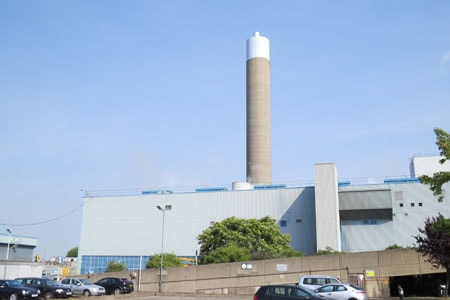The UK’s waste management industry trade association has dismissed a report by consultancy Eunomia into residual waste treatment capacity as ‘flawed’.
Other reactions to the study, which predicts an overcapacity of energy from waste plants, include one from the Department for Environment, Food and Rural Affairs which said it recognised the need for a mix of infrastructure. And, anti-incineration group UKWIN said much of what is incinerated now could be recycled.

The Edmonton incinerator in north London is to be replaced with a larger capacity plant
In a strong response to the Eunomia study, the waste management association view came from the Environmental Services Association. Its executive director Jacob Hayler said: “Eunomia’s findings are flawed and have been contradicted by report after report from everyone else who’s looked at our residual waste treatment needs.”
The consultancy’s report today (see letsrecycle.com story) is the twelfth in a series of studies into residual waste capacity.
Investment
Mr Hayler said: “Year after year these consultants have claimed that the UK was heading for overcapacity – its earlier reports suggested that we would already have reached overcapacity today – and it is galling that they continue to repeat the message when we are crying out for more investment in our industry. Their abilities to overstate available capacity and under-predict residual waste arisings are astounding.”
And, Mr Hayler said there was a consensus that the UK will be short of capacity. “The consensus position on waste treatment is that we will end up over five million tonnes short of energy from waste capacity by 2030. This is what the government needs to understand if it is not to sleepwalk into a capacity crisis.”

FCC Environment’s plant at Greatmoor, Buckinghamshire is one of a new set of energy from waste plants in the UK
The ESA has not referenced the claimed capacity shortfall but this is understood to be based on work by another consultancy. A response from Eunomia on the ESA’s remarks has been requested by letsrecycle.com.
‘Great progress’
Commenting on the research, a Defra spokesperson said: “We have made great progress in boosting recycling rates. This includes the proportion of household waste being recycled increasing from 11% to 44% between 2000 and 2015.
“We recognise the need for a mix of infrastructure and this will form part of a renewed strategy on waste and resources that looks ahead to opportunities outside the EU.”
‘Independent’
Shlomo Dowen, national coordinator of the UK Without Incineration Network said: “Most reports on residual waste treatment capacity are commissioned by companies with a financial stake in investment in new waste incineration capacity, whereas Eunomia’s reports are more independent.
“Eunomia’s latest report confirms that we will soon have more incineration capacity than residual waste. However, this understates the problem because much of what is currently described as ‘residual waste’ can actually be recycled or composted”.
BBC
The Eunomia report has also appeared in national media today including the BBC at Burning policy puts pressure on recycling targets.
Dominic Hogg, chair of Eunomia, told the BBC: “The most significant changes in recent years have been the switch from landfilling of waste to incinerating it. This reflects a complete absence of ambition, and gives rise to costs that are not justified by the benefits.”
Related links
Environmental Services Association
Eunomia
UK Without Incineration Network
The post ESA criticises Eunomia waste study as ‘flawed’ appeared first on letsrecycle.com.
Source: letsrecycle.com Waste Managment


